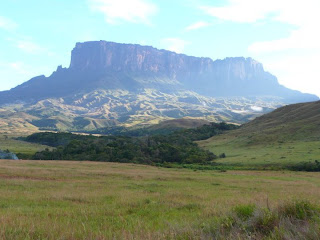Ibex Earth is delighted to announce that some of the footage that we shot during The Lost World Project is set to be used during the BBC's 'DECADE OF DISCOVERY' documentary, which airs on BBC TWO on Tuesday 14th December 2010 (8pm) and will then feature on BBC IPlayer until Tuesday 21st December 2010.
It will be the first time that anyone has seen the footage that we have taken and will be broadcast to a global television audience. Obviously we are going to recommend that you watch the show to see our clip, but 'DECADE OF DISCOVERY' looks like it could be one of the best nature documentaries on the BBC for quite some time, and is hosted by presenter Chris Packham...
Below is some additional information that we have received from the BBC about the programme, which starts at 8pm on Tuesday 14th December - well worth a watch! The documentary also features an interview with Stewart McPherson, who led The Lost World Expedition to South America's 'lost world'...
The 21st century is already being hailed as the new Golden Age of Discovery. In the last decade scientists and explorers have discovered a staggering quarter of a million new species, so in a celebratory one-off special, presenter Chris Packham chooses his personal top ten favourites, of the most extraordinary discoveries of the last ten years. These are the creatures no one dreamt even existed, the ones that have got the scientists in a spin and re written the text books! We get up close to the new discoveries and hear the extraordinary stories of how they were found – told by the charismatic world-class scientists and explorers who discovered them, the Indiana Jones’s of the natural world.
Some quotes from the scientists...
‘The fact that this lay undiscovered for all these years is almost beyond belief...’
‘It’s the insect equivalent of finding a blue whale or a redwood tree....’
‘The fact that something of this size lay undiscovered till the 21st century is staggering...’
‘Its like discovering a new species of elephant, its mind blowing...’
DECADE OF DISCOVERY proves the Earth can still surprise us.
Working alongside teams of scientists the BBC’s Natural History Unit filmed the most fantastic new species from around the world - from the jungles of Malaysia to the remotest forests of Madagascar. And there are many more weird, or just plain wonderful species also featured in the programme that don’t quite make it into Chris’s top ten.
In Chris’s top ten:
- The rarest mammal on planet earth - the pygmy three-toed sloth filmed swimming for the first time in the waters of the Caribbean. Only 200 left in the world
- a brand new species of lemur discovered during the making of the programme - a phaner lemur which is nocturnal and with forked markings Discovered by Russ Mittermeier, President of Conservation International and a top lemur scientist ( with two lemurs already named after him)
- anyone remember the Clangers? A sengi looks just like one. Sengi is the Swahili name for an elephant shrew. Weirdly not related to shrews at all, but distantly related to an elephant with a prehensile nose
- a huge Tanzanian monkey - the rarest in Africa – with a Mohican hairstyle, which until now was though to be a “spirit animal”. It turned out to be real, and not only that a new genus, more closely related to a baboon
- witness evolution in action with the discovery of a cave gecko – filmed side by side with a forest gecko. The cave gecko has evolved to stay safely away from pit vipers that live outside the cave in the Malaysian forest. What’s known as speciation in the making – the moment when one animal becomes two
- the walking shark – a nickname for the bamboo shark.. A distant cousin of the great white, it appears to walk along the shallow seabed as it searches for prey
- a carnivorous pitcher plant big enough for a fist to fit right inside and , in the remote and new species-rich Tepui mountains in Venezuela on Mount Ruraira, yet more new pitcher plants - in the Lost World that inspired the feature film UP
- the world’s longest insect – Chan’s Megastick – first found in Borneo, and almost as long as a human arm
- the big red jellyfish – revealed by the deep sea explorers of the Monterey Bay Aquarium Research Institute
- a giant slipper orchid, three times the size of any orchid seen before with flowers up to 20 centimetres across, which caused a scandal when it was first discovered

No comments:
Post a Comment